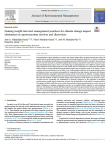Albaladejo-García J.A., Martínez-García V., Martínez-Paz J.M., Alcon F. (2025). Gaining insight into best management practices for climate change impact abatement on agroecosystem services and disservices. Journal of Environmental Management, 01/06/2025, vol. 384, p. 125629.
https://doi.org/10.1016/j.jenvman.2025.125629
https://doi.org/10.1016/j.jenvman.2025.125629
| Titre : | Gaining insight into best management practices for climate change impact abatement on agroecosystem services and disservices (2025) |
| Auteurs : | J.A. Albaladejo-García ; V. Martínez-García ; J.M. Martínez-Paz ; F. Alcon |
| Type de document : | Article |
| Dans : | Journal of Environmental Management (vol. 384, June 2025) |
| Article en page(s) : | p. 125629 |
| Langues : | Anglais |
| Langues du résumé : | Anglais |
| Catégories : |
Catégories principales 07 - ENVIRONNEMENT ; 7.6 - Changement ClimatiqueThésaurus IAMM CHANGEMENT CLIMATIQUE ; ATTENUATION DES EFFETS DU CHANGEMENT CLIMATIQUE ; IMPACT SUR L'ENVIRONNEMENT ; SERVICE ECOSYSTEMIQUE ; AGROECOSYSTEME |
| Résumé : | Given agriculture's direct dependence on nature, the climate change effects on agroecosystems may reduce (in quantity and/or quality) agroecosystem services and increase agroecosystem disservices. To achieve a transition pathway for sustainable intensification, best management practices (BMPs) should be considered. These practices may be even more necessary in intensified irrigated agroecosystems, especially in water-scarce areas such as the semi-arid Mediterranean region. There is a knowledge gap in understanding the role of BMPs for climate change impact abatement in these agroecosystems. In this context, the aim of this paper is to characterize the BMPs for climate change in semi-arid Mediterranean intensified irrigated agroecosystems, based on the analysis of agroecosystem services and disservices of six BMPs. A set of representative indicators of the agroecosystem services and disservices have been selected and quantified by using data from data statistics, interviews with farmers, specialized literature, geographic information systems and life cycle analysis. In addition, correlation analysis has been carried out to identify synergies and trade-offs between services and disservices for each BMPs. Results show that the adoption of BMPs for climate change impact abatement would enhance the provision of agroecosystem services. Specifically, the establishment of perimeter hedgerows or the application of biological control practices would improve biodiversity, whereas crop diversification would improve recreation services. The adoption of BMPs would also serve to reduce the provision of agroecosystem disservices, such as the use of organic fertilization to mitigate eutrophication and the use of regulated deficit irrigation to reduce irrigation water use. The adoption of a specific BMP that is expected to benefit one agroecosystem service may not have the same effect on the provision of another type of service or disservice, and vice versa. These results enable decision-makers in semi-arid Mediterranean irrigated agriculture to develop agri-environmental policies in response to climate change and to anticipate the expected benefits and burdens on their farms. |
| Cote : | En ligne |
| URL / DOI : | https://doi.org/10.1016/j.jenvman.2025.125629 |







